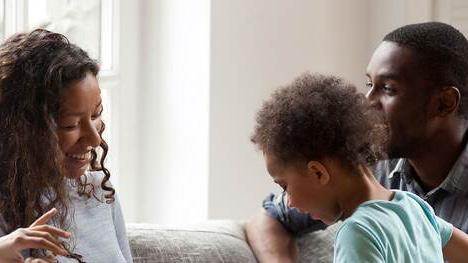Child safety in the Caribbean Netherlands is better organised
The safety of children always comes first. Especially within a family. That must be clear, both in the European Netherlands as in the Caribbean Netherlands (Bonaire, St. Eustatius and Saba).
That is why, it is added to the BES Civil Code that parents are responsible for the safety of the child and that no mental or physical violence may be used in the upbringing of a child. Nor is it allowed to treat the child in a humiliating way. This is already stated in the European Dutch Civil Code.
The bill that regulates the same for the Caribbean Netherlands has been submitted to the House of Representatives today by Minister Dekker (Legal Protection) and State Secretary Paul Blokhuis (Health, Welfare and Sport). This is in line with the Administrative Agreement on domestic violence and child abuse 2021-2024 between the Ministry of VWS and the governments of the islands of the Caribbean Netherlands.
The law makes it clear that all forms of violence in education are prohibited. For example, a "pedagogical" tap, violent or threatening words, or physical or mental neglect. Grabbing a child firmly to prevent danger, for example, to pull a child away from a dangerous situation, is allowed. This change in the law could thus initiate discussions about how parents can educate their children without violence. The bill thus contributes to the prevention of child abuse. Child abuse was otherwise already punishable in the Caribbean Netherlands on the basis of the BES Penal Code.
The rules in the BES Civil Code do not only apply to parents, but also to other people who take care of and raise a child. For instance a guardian or foster parents, but also grandparents or uncles and aunts, who are actually raising and caring for a child. The care for a child still remains the responsibility of the parents even outside of home. If the parents notice that their children are being mistreated and abused by others, they must take action to stop it.
In addition, refraining from violence in education fits within the pedagogical visions established by the boards of the Caribbean Netherlands with the local organisations. The islands therefore support that this is being written in a law.
Veiligheid kinderen in Caribisch Nederland beter geregeld
De veiligheid van kinderen staat altijd voorop. Juist binnen een gezin. Dat moet duidelijk zijn, zowel in Europees Nederland als in Caribisch Nederland (Bonaire, Sint Eustatius en Saba).
Daarom wordt aan het Burgerlijk Wetboek BES toegevoegd dat ouders verantwoordelijk zijn voor de veiligheid van het kind. En dat er geen geestelijk of lichamelijk geweld gebruikt mag worden in het opvoeden van een kind. Ook het kind vernederend behandelen is niet toegestaan. Dat staat al zo in het Europees Nederlandse Burgerlijk Wetboek.
Het wetsvoorstel dat hetzelfde regelt voor Caribisch Nederland is vandaag ingediend bij de Tweede Kamer door minister Dekker (Rechtsbescherming) en staatssecretaris Paul Blokhuis (Volksgezondheid, Welzijn en Sport). Dit past bij het Bestuursakkoord aanpak huiselijk geweld en kindermishandeling 2021-2024 tussen het ministerie van VWS en de besturen van de Caribisch Nederlandse eilanden.
In de wet wordt duidelijk dat alle vormen van geweld in de opvoeding verboden zijn. Bijvoorbeeld, een ‘pedagogische’ tik, gewelddadige of bedreigende woorden, of lichamelijke of geestelijke verwaarlozing. Het stevig beetpakken van een kind om gevaar te voorkomen, bijvoorbeeld om een kind weg te trekken bij een gevaarlijke situatie, is wel toegestaan. Deze wetswijziging kan zo gesprekken op gang brengen over hoe ouders kinderen kunnen opvoeden zonder geweld. Het wetsvoorstel draagt daarmee bij aan het voorkomen van kindermishandeling. Kindermishandeling was overigens al strafbaar in Caribisch Nederland op basis van het Wetboek van Strafrecht BES.
De regels in het Burgerlijk Wetboek BES gelden niet alleen voor ouders, maar ook voor andere mensen die een kind verzorgen en opvoeden. Denk hierbij aan een voogd of pleegouders, maar ook grootouders of ooms en tantes die feitelijk een kind opvoeden en verzorgen. De zorg voor een kind blijft ook buiten huis een verantwoordelijkheid van de ouders. Als de ouders merken dat hun kinderen mishandeld en misbruikt worden door anderen, moeten zij actie ondernemen om dit te stoppen.
Daarnaast past het afzien van geweld in de opvoeding binnen de pedagogische visies die door de besturen van Caribisch Nederland met de lokale organisaties worden vastgesteld. De eilanden steunen dan ook dat dit in een wet wordt opgeschreven.
